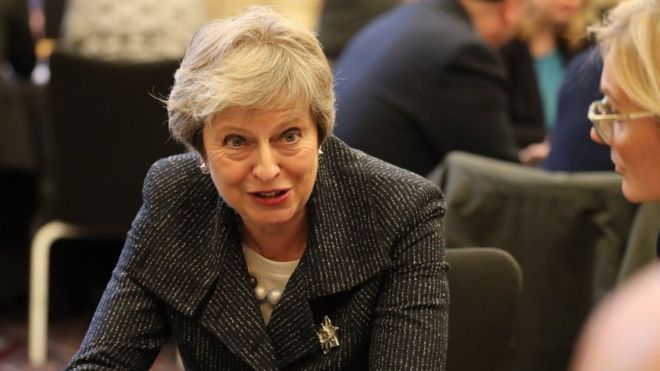World News
Why Theresa May’s Brexit Deal May Suffer Another Set Back

See Chances Of Brexit Deal Pulling Through At House Of Commons
Prime Minister Theresa May‘s Brexit deal today may again suffer a set back as Britain’s attorney general said last-minute changes secured from the European Union didn’t give Britain the power to cut itself free of ties to the bloc.
Geoffrey Cox said changes announced late Monday “reduce the risk” Britain could be stuck inside EU regulations indefinitely — but do not eliminate it. The two-page opinion said the U.K. could still not extract itself from the terms of the divorce deal unilaterally, a key demand of pro-Brexit British politicians.
In a written legal opinion, Cox said that if U.K.-EU negotiations became stalled through “intractable differences,” Britain would have “no internationally lawful means of exiting the Protocol’s arrangements, save by agreement.”
The House of Commons is due to vote later on the divorce deal, a day after talks with the EU produced promises that a contentious section of the agreement couldn’t be used to tie Britain to the bloc indefinitely — and less than three weeks before Britain is due to leave the EU on March 29.
Lawmakers defeated May’s deal by a whopping 230 votes in January, but PM May was hoping the changes she secured from the bloc would be enough to persuade many to change their minds.
That appeared unlikely after Cox’s assessment. John Whittingdale, a Brexit-supporting Conservative, said the attorney general’s advice was “pretty terminal” for May’s plan.
Similarly, another Brexiteer, Owen Paterson, tweeted that Cox’s opinion made it “brutally clear” that nothing had changed.
The pound, which had risen on hopes the deal would be passed, slumped by more than 1 percent against the dollar after Cox’s assessment, to trade at $1.3014.
Even before Cox gave his opinion, leading pro-Brexit Conservative Jacob Rees-Mogg expressed skepticism.
“I’m not sure that the agreements with the EU are a major change,” he said.
Other EU nations welcomed the overnight agreement and urged British politicians to seize the chance to back the deal and ensure an orderly departure.
German EU affairs minister Michael Roth, called it “a far-reaching compromise.” Dutch Prime Minister Mark Rutte said in a Twitter message that he was “pleased with the agreement,” adding: “An orderly #Brexit is crucial for both the EU and the UK. There is no alternative.”
But the main opposition Labour Party maintained its opposition to the deal. Labour Brexit spokesman Keir Starmer expressed skepticism about whether May had won substantive concessions.
“Having studied the documents, I would be surprised if they are sufficient to enable the Attorney General to change the central plank of his December legal advice,” Starmer said on Twitter.
May flew to Strasbourg, France, late Monday for talks with European Commission President Jean-Claude Juncker. At a news conference following the meeting, they announced changes designed to overcome lawmakers’ concerns about provisions designed to ensure the border between EU member Ireland and Britain’s Northern Ireland remains open after Brexit.
The mechanism, known as the backstop, is a safeguard that would keep the U.K. in a customs union with the EU until a permanent new trading relationship is in place. Brexit supporters in Britain fear the backstop could be used to bind the country to EU regulations indefinitely.
May said documents to be added to the deal provided “legally binding” assurances that the backstop would be temporary and that Britain would have a way to get out of it if the EU failed to negotiate in good faith. The two sides also agreed to continue working on technology that would do away with the need for border checks. However, the text of the 585-page withdrawal agreement remains unchanged.
“Now is the time to come together to back this improved Brexit deal and deliver on the instruction of the British people,” May said.
Irish Prime Minister Leo Varadkar said the deal agreed Monday night provided “additional clarity, reassurance and guarantees sought by some to eliminate doubt or fears, however unreal, that the goal was to trap the U.K. indefinitely in the backstop.
“It is not, these doubts and fears can be put to bed,” he said.
The EU warned British politicians that negotiations will not be reopened if Parliament rejects the deal again.
“In politics, sometimes you get a second chance. It is what you do with this second chance that counts. Because there will be no third chance,” Juncker said
“Let’s be crystal clear about the choice: it is this deal or Brexit might not happen at all,” he said.
If Parliament throws out May’s deal again today, lawmakers will vote over the following two days on whether to leave the EU without an agreement — an idea likely to be rejected — or to ask the EU to delay Brexit beyond the scheduled departure date (March 29
Some British lawmakers underscored that warning, telling their Brexit-backing colleagues that rejecting the deal could lead to Britain’s departure being postponed indefinitely.
“Today is our Hotel California moment. If we don’t check out tonight, we may never leave,” tweeted Conservative legislator Bob Seely.












